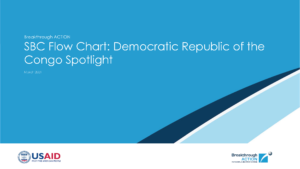Increasing use of health services and household family health practices are key to improving health outcomes in the Democratic Republic of Congo. Through exploratory, qualitative research, Breakthrough ACTION and community stakeholders identified some of the barriers to these behaviors: perceptions that health services are unaffordable, beliefs in the ability of traditional healers to address health issues, and the presence of gender norms that negatively affected decision-making about health service use. Breakthrough ACTION reported increased household health savings, intention to use family planning and antenatal care, and more immediate treatment-seeking for fever and diarrhea, as a result of playing health games in public spaces, providing personal savings banks, and conducting cost comparison activities. This Spotlight on the Democratic Republic of the Congo provides an overview of how Breakthrough ACTION applied the SBC Flow Chart to develop these solutions.
This website was created under the Breakthrough ACTION project. Breakthrough ACTION was supported by USAID’s Office of Population and Reproductive Health, Bureau for Global Health, under Cooperative Agreement #AID-OAA-A-17-00017. Breakthrough ACTION was led by the Johns Hopkins Center for Communication Programs (CCP). This website is now maintained by CCP and its contents are the sole responsibility of CCP. The information provided on this website does not necessarily reflect the views of USAID, the United States Government, or the Johns Hopkins University.
© Johns Hopkins University. All rights reserved.


